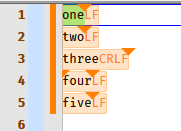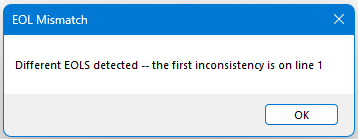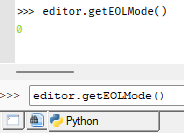Search for inconsistent line endings with a regex? (part 2)
-
Hello @alan-kilborn and All,
Really, Alan, I think you’re making it difficult for yourself !!
So, given a file, if you just want to grab all the inconsistent “End of Lines” AND that you expect your file to be :
-
A Windows file, use the regex
\r(?!\n)|(?<!\r)\n -
A Unix file, use the regex
\r\n|\r(?!\n) -
A Mac file, use the regex
\r\n|(?<!\r)\n
If you just want to select all text from current position till the first inconsistent “End of Lines” AND that you expect your file to be :
-
A Windows file, use the regex
(?s).*?(\r(?!\n)|(?<!\r)\n) -
A Unix file, use the regex
(?s).*?(\r\n|\r(?!\n)) -
A Mac file, use the regex
(?s).*?(\r\n|(?<!\r)\n)
Finally, if you prefer to highlight ( and bookmark ) all the lines, containing inconsistent “End of Lines” AND that you expect your file to be :
-
A Windows file, use the regex
(?-s).*(\r(?!\n)|(?<!\r)\n) -
A Unix file, use the regex
(?-s).*(\r\n|\r(?!\n)) -
A Mac file, use the regex
(?-s).*(\r\n|(?<!\r)\n)
Best Regards
guy038
P.S. :
I’m surely missing something ! Why don’t you use the
Edit > EOL Conversionoption ? Whatever the number of EOL’s mixing in your current file, choose, firstly, any non-grayed option and secondly, choose your desired EOL => all the inconsistent EOL should have been changed into the expected type ;-)) -
-
Hello @guy038 !
Well, I didn’t really explain my goal, did I?
Recently I’ve been manipulating some data where I can get mixed line-endings in a file (initially). So I want to be “made aware” of the situation without having to do anything. So I’ve created a script whereby if mixed line-endings occur in one area (between
start_posandend_pos, see script segment above) then I will, in code, turn visible line-endings ON. This way it hits me in the face, the current situation.Anyway, I don’t know the file type (Windows/Linux, Mac really isn’t happening) in advance so I can’t do stuff based upon that. And I can’t ask the “notepad” Python object what the current file format is anyway, because if I happen to have a WIndows file open in editor1/view0 and a Linux file open in editor2/view1, bad things happen to the logic.
Probably the above makes no real sense, but I’m just trying to say that I don’t think I’m making it hard on myself, I’m just doing what it takes for a solution. And I did arrive at that solution today; stuff is working fine now. :)
-
Hi, @alan-kilborn and All,
Yeeeeaaaah ! I succeeded to built a search regex which grabs all character(s) from the first
EOLcharacter(s) found to the nearest otherEOLcharacter(s), excluded, which is /are different from the first one ;-))I’m using the free-spacing mode for a best comprehension !
(?sx) ( \r\n .*? (?= (?<!\r)\n | \r(?!\n) ) | # From a TRUE \r\n...to....a TRUE (\n|\r) EXCLUDED (?<!\r)\n .*? (?= \r\n | \r(?!\n) ) | # From a TRUE \n.....to....a TRUE (\r\n|\r) EXCLUDED \r(?!\n) .*? (?= \r\n | (?<!\r)\n ) # From a TRUE \r.....to....a TRUE (\r\n|\n) EXCLUDED )
To test my regex, just paste, in a new N++ tab, the sample text, below ( the v
7.6change.log, slightly modified ) :Notepad++ v7.6 new feature and bug-fixes:<CRLF> <CR> <CRLF> 1. Add Built-in Plugins Admins. Users can install, update and remove plugins by some clicks via Plugins Admin:<CRLF> https://notepad-plus-plus.org/features/plugin-admin.html<LF> 2. Change plugin loading method: Remove the legacy plugin loading way and apply only the new plugin loading method.<CRLF> 3. Add new message NPPM_GETPLUGINHOMEPATH in Notepad++ API for plugin, so plugin can get its path easily.<CR> 4. Fix a regression of performance issue while word wrap option is enable.<CRLF> 5. Fix a performance issue for switching back to folded document.<LF> <CR> 6. Fix crash issue due to Unix style path input in Open file dialog.<CR> 7. Fix UTF-8 detection problem: 4 byte characters UTF-8 character can be detected now.<CR> 8. Enhance/Fix encoding detection/problem.<CRLF> <LF> <CRLF> <CR> 9. Fix auto-indent issue by typing Enter on empty line.<LF> 10. Fix "Close all but this" behaviour if multiple views are present and some files are dirty.<CR> 11. Fix tool tip in document switcher showing the old name issue (after being renamed).<CRLF> <LF> <CR> <CRLF> <LF> <LF> <CRLF> <CRLF> <CR> 12. Add autoit and lua autoCompletion<CRLF> <CRLF> <CR> <CRLF> Included plugins:<CRLF> <CRLF> <LF> 1. NppExport v0.2.8 (32-bit x86 only)<LF> 2. Converter 4.2.1<LF> 3. Mime Tool 2.1<CRLF> 4. DSpellCheck 1.4.6<LF> <LF> <LF> <CR> Updater (Installer only):<CRLF> <CRLF> * WinGup (for Notepad++) v5.0.4<CRLF>
Then, with that regex S/R, below, we are going to change, first, in this new tab, the EOL characters to get a final text with all forms of line-breaks :
SEARCH
(?-i)(?:(<CRLF>)|(<LF>)|(<CR>))\RREPLACE
(?1\r\n)(?2\n)(?3\r)Now, you can play around, with my free-spacing regex above ;-))
Cheers,
guy038
P.S. :
If a file do not contain inconsistent
EOL( i.e. if all the line-breaks, of current file, have the same form ) NO match occurred, as expected !! -
-
slightly different approach
regex_dict = {0:'\r[^\n]|[^\r]\n', 1:'\n', 2:'\r',} def check_eol(match): notepad.messageBox('Different EOLS detected','EOL Missmatch', 0) editor.research(regex_dict[editor.getEOLMode()], # regex check_eol, # function to call 0, # re flags 0, # start editor.getTextLength(), # end 1) # count -
I either forgot about or never knew about
editor.getEOLMode(). Perhaps I could have used that knowledge YESTERDAY before I finished my design the way I did. :(but Thank you.
-
So it appears the reason (maybe) that I never noticed
editor.getEOLMode()before is that I “grew up” here on Community sample scripts where it seems thatnotepad.getFormatType()was used much more frequently for a very similar purpose. On an integer basis the functions even return the same number values!I suppose the
notepad.getFormatType()function is for what Notepad++ thinks the setting is for a file upon loading, and after that it follows the current user setting for “EOL conversion”…and theeditor.getEOLMode()function usually follows thenotepad.getFormatType()setting, but could be set independently (via PS code call toeditor.setEOLMode()).I did verify this, the
editor.getEOLMode()value follows thenotepad.getFormatType()value, and if youeditor.setEOLMode()to something different than the Notepad++ EOL setting, and then switch the active tab and then come back to the original tab,editor.getEOLMode()will again be back at thenotepad.getFormatType()setting. [A fair number of settings work this way: You can change them via PSeditorfunctions, but a switch of tabs and a return will find them reset to original Notepad++ controlling values.]For my purposes, however, the
editorfunction is valuable to know the setting foreditor1andeditor2, without, say, having to makeeditor2the active editor–when it isn’t currently–and then callingnotepad.getFormatType().…if that all makes any kind of sense to you. :)
-
You are absolutely right and this is something one needs to keep in mind.
Whenever possible, a notepad object method should be used to stay in sync with npp. Npp itself does, as far as I understand the code, use SCI_SETEOLMODE and SCI_GETEOLMODE to set/get the current eol and as far as I have understood,
scintilla only checks the first line to determine the eol mode.I would say, to get a value it is safe to use editor object methods but, as said, if one wants to change something then notepad object methods should be preferred.
-
My guess is that it was locked by “Father Time”! (i.e., age + inactivity)
very funny … nooot
- no: topics don’t get locked automatically, when marked as solved.
- yes: topics have to be locked manually.
- no: this topic was not locked, to prevent follow up posts, in order to preserve it’s extraordinary state for eternity, like keeping an ancient ming vase empty.
- no: there was no content reason to lock this topic.
- no: the community place does not need a clean up, as the separate information exchange does not interfere with the issue tracker readability for developers.
- maybe: this was one of those topics, that got spammed back then, and was locked to contain it a bit.
-
@Ekopalypse said:
Whenever possible, a notepad object method should be used to stay in sync with npp
if one wants to change something then notepad object methods should be preferred
Very much agree. Usually the
notepadobject provides only get access, e.g. in this casenotepad.getFormatType()has no correspondingnotepad.setFormatType(). In order to do the set, one must do `notepad.menuCommand(MENUCOMMAND.FORMAT_TOUNIX) as an example. This is nice because it keeps the Notepad++ user interface consistent.Note a very similar discussion involving View -> Show Symbol -> … menu items via script control is found here: https://notepad-plus-plus.org/community/topic/14585/turn-on-off-the-line-ending-symbols-via-script
-
A stretch for staying on-topic, but I found a great way to set up a scenario for inconsistent line-endings, from the hand of @donho himself:
- Open a file with Unix (Linux) line-endings
- Select all (ctrl+a)
- Invoke Plugins -> Mime Tools -> Quoted-printable Encode
Boom. A very mixed line-endings file (Unix and Windows ends) now results.
(I discovered this when I was needing to mime a short file. I decided I don’t like how the Mime Tools plugin does its thing–not just this line-ending thing–and will resort to WinZip’s mime for my future miming needs.)

-
@Ekopalypse said in Search for inconsistent line endings with a regex? (part 2):
regex_dict = {0:‘\r[^\n]|[^\r]\n’,
1:‘\n’,
2:‘\r’,}def check_eol(match):
notepad.messageBox(‘Different EOLS detected’,‘EOL Missmatch’, 0)editor.research(regex_dict[editor.getEOLMode()], # regex
check_eol, # function to call
0, # re flags
0, # start
editor.getTextLength(), # end
1) # countI know this topic is ancient, but what exactly do I do with the sample code above? Is it supposed to be an external command, a configuration file, ?
-
there is a plugin called PythonScript that allows you to manipulate data in notepad++.
Here are the steps on how to create and use it.
The purpose of the script is to check whether the current document has different line endings (EOL), which can be problematic if you edit a file under Windows and then upload it to a Linux server, for example.
-
Hello @ekopalypse, @alan-kilborn and All,
@ekopalypse, I did not completely understand your script so I changed it and improved it as below :
check = True false_EOL = {0:'$[^\r][^\n]', # Miss the TWO chars \r\n at 'end of line' as editor.getEOLMode() = 0 ( Windows EOL ) 1:'\n', # Should be \r as editor.getEOLMode() = 1 ( Macintosh EOL ) 2:'\r', # Should be \n as editor.getEOLMode() = 2 ( Unix EOL ) } def check_eol(match): global check check = False notepad.messageBox('Different EOLS detected','EOL Mismatch', 0) editor.research(false_EOL[editor.getEOLMode()], # regex to search for check_eol, # function to call if regex match 0, # re flags 0, # START of file editor.getLength(), # END of file 1) # count ( at FIRST match ) if check == True: notepad.messageBox('All EOLS correct','EOL check', 0)
Remarks :
-
I changed the word
missmatchasmismatchwhich seems to be the right spelling ! -
I changed the name of the Python dictionnary from
regex_dicttofalse_EOL. Thus, it emphasizes the wrong EOLS to match, in each case -
I added a way to indicate when all the EOL are correct
-
Finally, I modified the regex used to dectect false EOLS when the file is supposed to be a
Windowsfile
So, I changed :
false_EOL = {0:'\r[^\n]|[^\r]\n', # Miss \n AFTER OR \r BEFORE as editor.getEOLMode() = 0 ( Windows EOL )By :
false_EOL = {0:'$[^\r][^\n]', # Miss the TWO chars \r\n at 'end of line' as editor.getEOLMode() = 0 ( Windows EOL )Because in case of huge files, the former syntax would lead to a
RuntimeErrorregarding the regex. With the latter one, everything seems to work better !
Now, to be sure that your file contains normalized
EOLsonly, simply run, consecutively, the two commands below :- For a
Windowsfile :
Edit > EOL conversion > Unix (LF) Edit > EOL conversion > Windows (CR LF)- For an
Unixfile :
Edit > EOL conversion > Macintosh (CR) Edit > EOL conversion > Unix (LF)- For a
Macintoshfile :
Edit > EOL conversion > Unix (LF) Edit > EOL conversion > Macintosh (CR)Best regards,
guy038
-
-
@guy038 said in Search for inconsistent line endings with a regex? (part 2):
Now, to be sure that your file contains normalized EOLs only, simply run, consecutively, the two commands below
OR… have your script do it. Add these lines into your script, after the indicated existing lines:
def check_eol(match): # <--- existing line in script global check # <--- existing line in script check = False # <--- existing line in script #notepad.messageBox('Different EOLS detected','EOL Mismatch', 0) # <--- existing line in script, but now turned into a comment line_of_first_mismatch = editor.lineFromPosition(match.span(0)[1]) notepad.messageBox('Different EOLS detected -- the first inconsistency is on line ' + str(line_of_first_mismatch),'EOL Mismatch', 0) user_input = notepad.prompt('Convert all line-endings in file?\r\nIf so, enter 0 for CRLF, 1 for CR, 2 for LF', 'INCONSISTENT LINE-ENDINGS DETECTED!', editor.getEOLMode()) if user_input is not None: desired_eol_index = int(user_input) if 0 <= desired_eol_index <= 2: eol_cmd_list = [ MENUCOMMAND.FORMAT_TODOS, MENUCOMMAND.FORMAT_TOMAC, MENUCOMMAND.FORMAT_TOUNIX, ] if desired_eol_index == editor.getEOLMode(): notepad.menuCommand(eol_cmd_list[(desired_eol_index + 1) % 3]) # change to undesired line-endings notepad.menuCommand(eol_cmd_list[desired_eol_index]) # change to desired line-endingsNote also that I took the liberty of adding in some logic to tell you which line number has the first inconsistent line-ending.
-
Hello, @alan-kilborn,
I’ll study your last solution, on Monday 18 ( Again, I’m away on a three-day ski trip 😉 )
Best Regards,
guy038
-
Hello, @ekopalypse, @alan-kilborn, and All,
Like you proposed, @alan-kilborn, the enhanced script becomes :
check = True false_EOL = {0:'$[^\r][^\n]', # Miss the TWO chars \r\n at 'end of line' as editor.getEOLMode() = 0 ( Windows EOL ) 1:'\n', # Should be \r as editor.getEOLMode() = 1 ( Macintosh EOL ) 2:'\r', # Should be \n as editor.getEOLMode() = 2 ( Unix EOL ) } def check_eol(match): global check check = False line_of_first_mismatch = editor.lineFromPosition(match.span(0)[1]) notepad.messageBox('Different EOLS detected -- the first inconsistency is on line ' + str(line_of_first_mismatch),'EOL Mismatch', 0) user_input = notepad.prompt('Convert all line-endings in file?\r\nIf so, enter 0 for CRLF, 1 for CR, 2 for LF', 'INCONSISTENT LINE-ENDINGS DETECTED!', editor.getEOLMode()) if user_input is not None: desired_eol_index = int(user_input) if 0 <= desired_eol_index <= 2: eol_cmd_list = [ MENUCOMMAND.FORMAT_TODOS, MENUCOMMAND.FORMAT_TOMAC, MENUCOMMAND.FORMAT_TOUNIX, ] if desired_eol_index == editor.getEOLMode(): notepad.menuCommand(eol_cmd_list[(desired_eol_index + 1) % 3]) # change to UNDESIRED line-endings notepad.menuCommand(eol_cmd_list[desired_eol_index]) # change to DESIRED line-endings editor.research(false_EOL[editor.getEOLMode()], # regex to search for check_eol, # function to call if regex match 0, # re flags 0, # START of file editor.getLength(), # END of file 1) # count ( at FIRST match ) if check == True: notepad.messageBox('All EOLS correct','EOL check', 0)
Now, given this simple text :
This is a little test to try if OK-
With
Windows (CR LF)in the status bar -
With line
4ending with CR -
line
6ending with3spaces + LF -
And all the other lines ending with CRLF
When running the script, it said :
Different EOLS detected -- The first inconsistency is on line 6, although it should be on line4ending with CR !
Still searching for other oddities :-)
Best Regards,
guy038
-
-
@guy038 said :
Different EOLS detected – The first inconsistency is on line 6, although it should be on line 4 ending with CR !
Well… that seems to be because
$[^\r][^\n](when searching from top of file) misses line 4 and matches the LF at the end of line 6 and thetat the start of line 7.The original regex of
\r[^\n]|[^\r]\nseems to work better… -
I noticed that other odd things can happen.
Example:
I created a
Unix (LF)file and put some lines in it, and then changed one of the line’s endings to CRLF:
The status bar said:

Running the script said:

but it should have said line 3.
Moving to the PS console window and checking the EOL mode, I discovered:

So I seem to have found a case where something is out of sync: Notepad++ 's status bar says LF for line-endings, but the Scintilla buffer says something different (CRLF).
EDIT: I seem to have figured out why: The editorconfig plugin seems to be interfering. I have it set for CRLF for the file in question. However, I’d have thought that this plugin only does things when I save a file, and in the above I’ve not saved the data. Oh, well, (non)problem solved.
-
This time I’ve found a real bug in the script, and it is with the code I suggested:
Buggy code:
line_of_first_mismatch = editor.lineFromPosition(match.span(0)[1]) notepad.messageBox('Different EOLS detected -- the first inconsistency is on line ' + str(line_of_first_mismatch),'EOL Mismatch', 0)Better code:
line_of_first_mismatch = editor.lineFromPosition(match.span(0)[0]) notepad.messageBox('Different EOLS detected -- the first inconsistency is on line ' + str(line_of_first_mismatch + 1),'EOL Mismatch', 0)